According to reports, a large number of well-funded electric vehicle start-ups are rapidly emerging, especially from China's electric vehicle companies, which are challenging Tesla Motors' leading position in the electric vehicle market, which is also the next generation electric vehicle industry. Development has provided new impetus.
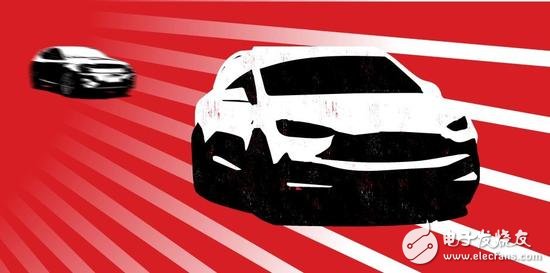
PitchBook, the global data research organization, released the latest data showing that in the first few months of 2018, electric car startups raised more than $2 billion in the United States, far more than the $650 million raised in 2017. And investment trends indicate that Tesla will become more competitive with established car companies and emerging manufacturers in the next few years.
All of this activity is due to the rapid expansion of the electric vehicle industry. According to market intelligence firm Absolute Reports, the value of the electric vehicle market is expected to reach $356.5 billion by 2023, with sales in the Asia Pacific region reaching $205.9 billion. Given this expectation, there is no doubt that investment in electric vehicle companies and their supporting technologies will continue to climb, and most of the cash may be invested in newly established companies.
PitchBook's data shows that investment in the early stages of electric car startups is rapidly increasing, with only 15 angel investments invested in entrepreneurial electric car companies in 2017. In 2018, this type of investment accounted for the majority of the $2 billion fundraising.
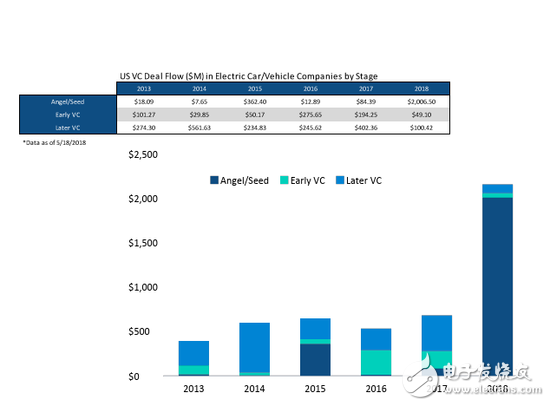
(Photo: PitchBook data shows that investment in the early stages of electric car startups is increasing rapidly in 2018)
Many of the challengers in the field of electric vehicles stand out from the wreckage of other companies that are trying to gain a favorable position in the dominant position in the competitive automotive industry. Faraday's future and Fisker AutomoTIve first collapsed, and then reborn under the support of global billionaires. In the process, several new companies have emerged, and Chinese ventures with abundant funds and venture capital institutions have Efforts to seize the dominant position of the Tesla market have not been abandoned.
Troublesome TeslaAlthough the expansion of the electric vehicle market is an important factor in promoting competition, another factor that cannot be ignored is the series of mistakes made by Tesla, the leader in the electric vehicle market. Tesla's competitors are skeptical that Tesla can finally achieve the grand vision of its CEO, Elon Musk.
In any case, Tesla’s luck seems to have been bad since 2018. The Consumer Report has just released a report saying it can't recommend the company's latest product, Model 3. This new car is Tesla's first effort to produce low-cost electric vehicles, which has brought numerous problems and problems to Musk and its company. Cost overruns have led many media to speculate that Tesla does not have enough cash support to survive this year.
Tesla spent too much money compared to the old car manufacturer's competitors. According to Bloomberg data, the company’s workforce has surged from less than 1,000 in 2010 to nearly 40,000 today. Compared with Tesla, each employee of GM and Ford creates 2.5 times more revenue per employee than Tesla employees. The plan to actively introduce new models has also complicated production problems. Tesla's propaganda machine has announced that the new Roadster sports cars, crossovers and electric semi-trailers will be available in the next few years.
Production stagnation and cost overruns are not the only concerns of Tesla. The National Transportation Safety Board (NTSB) is investigating the company's responsibility for drones in fatal accidents. With Musk's “flattening†the company's management structure, many executives have left. It's no wonder that start-up executives who have just entered the market may think that Musk and Tesla may no longer be in a dominant position.
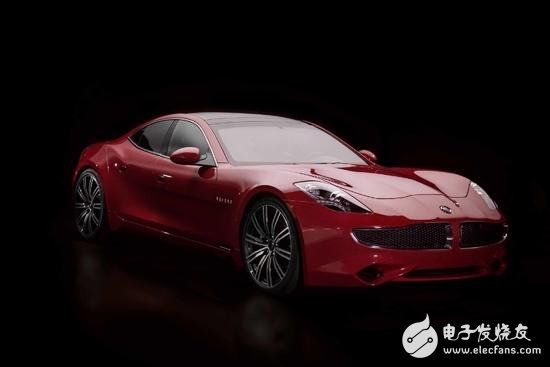
It is in this context that competitors such as Evelozcity and Independent Electric Vehicles have entered the market and may challenge Tesla's dominance. Both companies are companies founded by Faraday's future retired executives. Independent Electric Vehicles has always kept a low profile. Apart from knowing that it has Chinese investor support, the management team is headed by Steve Osario (Faraday's former design and operation and advanced model development director). .
But Evelozcity has caused a stir. The company is headquartered in Los Angeles and is said to have received $1 billion in funding from international sponsors and an experienced management team, in addition to Faraday's future executives, as well as former BMW Chief Financial Officer Stefan Krauss (Stefan Krause), Richard Kim, who helped develop the BMW i3 and i8 in-vehicle equipment, and Karl Thomas-Neumann of GM's European division also joined.
Two other companies in the Los Angeles area, Karma AutomoTIve, based in Irvine, Calif., and the revived Fisker, are also investing in new cars. In addition, there is the future of Faraday, which is “rebornâ€, which is said to have received $1 billion in investment before being forced to go bankrupt. What these Tesla potential competitors have in common is that they are determined to abandon the principles of car manufacturing and switch to a completely new approach.
A newly established early electric car company executive said: "For many people, the electric vehicle industry still has a lot of room for growth. Just like the internal combustion engine industry, when it first appeared, there were thousands of companies. Fierce competition for smaller markets."
Global competition, China has the potential to leadIf the new entrants in the United States are not too worried about Tesla, the flood of electric car companies from China will alert them. Previously, the media listed 10 electric vehicle start-ups from China. They have strong capital and strong manufacturing strength, which may cause great trouble for other independent electric vehicles and automakers who focus on driverless driving. Padmasree Warrior, head of the US-based subsidiary of Shanghai-based electric car startup Weilai Auto, said: "Tesla has paved the way for us, and now we have taken another step."
It is not surprising that Chinese investors are entering the market in a big way. After all, electric vehicle sales in the Asia-Pacific region will reach $205.9 billion. Investors have already anticipated an upward trend in demand. In 2017 alone, there are at least 34 new start-ups to help solve the ecosystem problems of electric vehicles.
These include Byton, which is supported by China's largest fund, Legend Capital, automaker Harmony Auto, and League AutomoTIve Technologies. Bayern is expected to begin production in 2019, and its experienced management team members are from the world's best manufacturers.
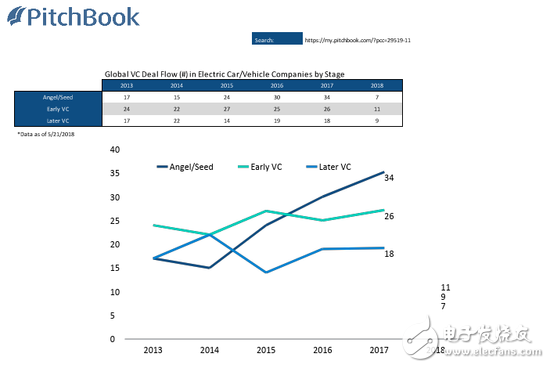
Supporters of Weilai Auto are also eye-catching, including Chinese technology giants Baidu, Tencent Holdings and Xiaomi. Investors also include Sequoia Capital and Gaochun Capital. In addition, Tencent, Baidu and Sequoia Capital also support another electric vehicle manufacturer, Weimar Motors, a Shanghai-based Tesla competitor with Zhejiang Geely Holding Co.
The three new entrants are three other companies, such as Xiaopeng Automobile (supported by Alibaba and Foxconn technology giants, as well as four investors including IDG Capital, Yunfeng Capital, CICC and Chenfeng Investment Company). A singular car supported by the municipal government of Tongling City, Anhui Province, and a “car and home†supported by Zhejiang Leo Group and Changzhou Wunan New Energy Automobile Company.
If anyone wants to know how Chinese automakers can make a difference in the market, then look at the role of Chinese companies in dramatically reducing the cost of solar panels and wind turbines, and these suppliers now control the global renewable energy market. The way.
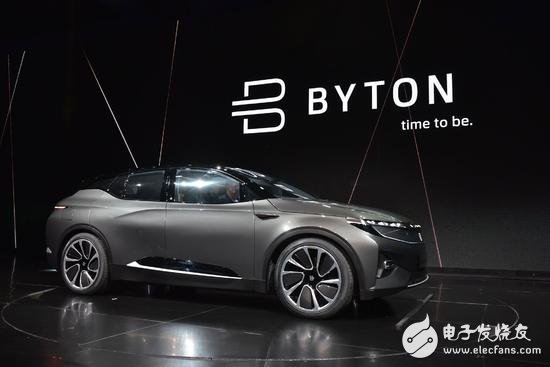
Photo: At the 2018 CES conference in Las Vegas on January 7, 2018, people saw the connected cars of Baiteng
Big car company big betAlthough these companies have raised billions of dollars from investors and promised to build the next generation of electric vehicles, the first major automakers who developed the technology (and subsequently shelved the technology) have been forced to electrify. A huge bet. According to Reuters, at the beginning of this year, large auto companies will invest at least $90 billion to elect at least some of the most popular cars in the next few years.
The power of large auto companies comes from the competition between Tesla and startups, but more importantly, government regulatory pressures from China, Europe and the United States. An executive of an emerging electric car company said: "This huge market opportunity has three competitors, the first one is OEM (original equipment manufacturer). But they must learn from Tesla how to do it."
Initially, these companies were skeptical about market adoption, but now they have no choice because China is the first to take action on regulation. The executive said: "The government will push it forward, but the government will have to deal with the problem of increasing profit margins and consumer costs." For the executive, in the early stages of car electrification, the two Loyal companies are General Motors and Volkswagen.
In addition to large auto companies, the executive also said that large technology companies are also the biggest competitive threat, such as Google and the driverless car company Waymo parent company Alphabet, Apple.
Although all competitors are turning to electric, Muske's Tesla is still the king of the field, although it has many mistakes. In fact, Musk was the first person to build a new independent car company in the last century. This is an amazing achievement, but he is achieved in a completely different competitive environment. When only two or three cars are to be defeated, it is easy to win the game. However, in the face of more intense competition, Tesla's performance remains to be seen.
Could you share which points you care more when choose a teacher laptop? Size, cpu, storage, memory, battery, screen, fingerprint or backlight? As one of the top laptops for teachers in 2022, this 15.6 inch celeron N5095 or J4125 online teaching laptop is of the special necessary features a laptop for online teaching has. For example, high quality 1080P screen, bigger battery, updated storage and memory, mid-level cpu, etc. So many clients choose this model as laptop for teachers malaysia or laptops for teachers program.
Of course, there are other type Education Laptop, like 14 inch windows 10 64 gb Student Laptop, 15 inch 10th good laptops for university students, 16.1 inch i7 9th hq 4gb video graphic laptop, etc.
If you have other type device interest, just let us know since we also customize android or windows tablet, Mini PC and All In One PC.
Believe always have a right one meeting your special demand, no matter for student project, business tender, academic institution or reselling.
Teacher Laptop,Online Teaching Laptop,Top Laptops For Teachers,Laptop For Teachers Malaysia,Laptops For Teachers Program
Henan Shuyi Electronics Co., Ltd. , https://www.shuyioemelectronics.com